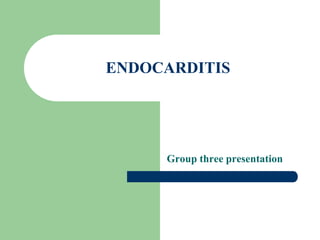
Endocarditis
- 1. ENDOCARDITIS Group three presentation
- 2. Group members Shida mbeye Taonga kanyenda Panesi white Chigomezgo munthali Maria kamanga Gilly banda
- 3. BROAD OBJECTIVE By the end of the presentation the audience must acquire knowledge and skills on the condition of endocarditis
- 4. SPECIFIC OBJECTIVES Definition of endocarditis Etiology Risk factors Pathophysiology Clinical manifestation Diagnostic evaluation Nursing assessment Nursing diagnosis Nursing management Medical management complications
- 5. Introduction The heart is a vital organ that pumps blood and it has three layers which are endocardium, myocardium and pericadium.
- 6. definition • Endocarditis is an inflammation of the inner layer of the heart, the endocardium. it usually involves the valves and other structures like the intraventricular and septum.
- 7. etiology Fungus e.g. candida, aspagellus Gram negative organisms e.g. pseudomonas Bacterias e.g. staphylococci Acute rheumatic fever which cause enlarged and tender lymph nodes, damages the valves Congenital heart disease
- 8. Risk factors Previous heart damage Dental procedures which lead into the introduction of bacterias Heart surgery Intubations Procedures involving gastrol intestinal and genitourinaly tracts e.g. barium, enemas, sigmoidoscopy, catheterisation and cytoscopy Reproductive conditions like delivery of new babies, abortions and pelvic inflammatory disease
- 9. pathophysiology Usually in this case the bacterias or any other causing agents enter the blood stream through invasive procedures like dental procedures, surgery , urinary catherisation. Then they accumulate on the valves of the heart or endocardium Finally they form vegetations or crusters These vegetation they lead into damage heart valves by perforating and deforming the valves leaflets This at the end leads to tearing which means there is poor flow of blood and lead into accumulation of blood in chambers of the heart hence endocarditis
- 10. Clinical manifestations Loss of vision Ischemia Fever Shortness of breath Shock Finger clubbing Myocardial infarction Weight loss Malaise Chills Night sweats Chest and abdominal pain anorexia
- 11. Diagnostic evaluation Blood culture; helps in testing the presence of microorganisms Urinalysis to see microscopic hematuria. Doppler echocardiography assist in the diagnosis by demonstrating a muscle on the valve. Computerized tomography rule out heart damage Review bun and creatinine levels to evaluate renal function Review endocardiography finding if available for valvuler and ventricular function and presence of vegetation Review white blood cell count to evaluate course if infection
- 12. Nursing assessment It includes history taking like; – Subjective data: – past medical history: patient asked of signs of the disease and the onset of the disease and review with patient history of risk factors like cardiac failure, shock – Medication history: has the pt ever taken any medication, what happened afterwards – Family history:asked of any case at home of the similar conditions
- 13. – Social history: social behaviours that can trigger the problem – Surgical history: if ever operated on – Objective data: assess for temperature elevations, heart mummer, evidence of cough , peripheral edema and embolism, alscultate for heart sound, monitor arterial blood gas, rapid purse rate,dyspnea, restlessness and manifestation of heart failure
- 14. Nursing diagnoses Infective breathing pattern related to inflammation of heart muscle as evidenced by use of accessory muscle, dyspnea. Impaired gaseous exchange related to fluid accumulation in the lungs as evidenced by shortness of breath Decreased cardiac output related to valvular dysfunction as evidenced by poor tissue perfusion Imbalanced nutrition less than body requirement related to anorexia as evidenced by loss of weight.
- 15. Altered thermoregulation related to infection as evidenced by increased body temperature (fever). impaired physical mobility related to fatigue Ineffective tissue perfusion related to embolisation Anxiety related to hypoxia or life threatening situation as evidenced by patient verbalization Altered comfort pain related to use of accessory muscle as evidenced by patient verbalization
- 16. Nursing management Position the patient at semi fowlers position to help in infective breathing through providing enough room for lung expansion as abdominal contents goes down Administer oxygen therapy 4-6 l/min to help pt in breathing effectively through supplementing oxygen Monitor arterial blood gas , carbon dioxide, oxygen saturation hourly and document to monitor signs of respiratory acidosis Encourage and provide small frequent meals reach in proteins helping in repairing worn-out tissues Monitor vital signs , heart and lung sound, level of consciousness to evaluate how effectively the organs like the heart and the lungs are working
- 17. Schedule nursing activities to allow rest Encourage and assist pt to cough and deep breath to promote chest expansion provide tepid sponging to reduce raised body temperature by evaporation and conduction Encourage patient on exercises in order to improve patients mobility through making the body physically fit Make yourself available to the patient and nurse with love and respond well to his/her questions to array pain and anxiety Educate the patient on disease process to make pt cope up with therapy and the condition
- 18. Medical management if the patient is having poor intake of oxygen administer oxygen therapy 4-6 l/m in helping the patient get supplemented with enough oxygen Administer antibiotic treatment like ampicillin + flucloxacilin +gentamicin Administer pcm 1g tds p.o as analgesic that help in relieving pain Administer inotropic drugs like digoxin that help in increasing contractility of the heart The patient can also be administered with morphine which help to decrease anxiety
- 19. complications Chronic heart failure Shock Stroke embolism
- 20. In conclusion Endocarditis as explained above it is the inflammation of endocardium and it brings a lot complications Therefore:
- 21. references PAUL ONEILL (2012), MASTER MEDICINE. SECOND EDITION LINTON (2007). INTRO. TO MEDI-SURGE NURSING,4TH EDITION •S. Lewis, M. Heitkemper, S. Dirksen, P. Obrien and L. Bucher (2007) Medical Surgical Nursing; Assessment and Management of Clinical problems (7th edition)St Louisi, Mosby.
